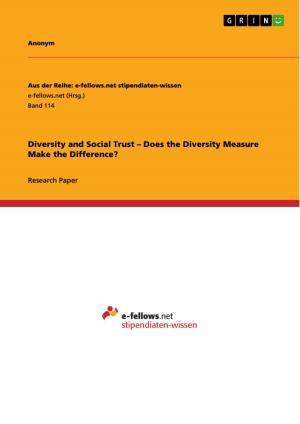Towards Global Sustainable High Seas Fisheries. A critical assessment
Nonfiction, Science & Nature, Science, Biological Sciences, Environmental Science| Author: | Elise Verdonck | ISBN: | 9783656845737 |
| Publisher: | GRIN Verlag | Publication: | November 25, 2014 |
| Imprint: | GRIN Verlag | Language: | English |
| Author: | Elise Verdonck |
| ISBN: | 9783656845737 |
| Publisher: | GRIN Verlag |
| Publication: | November 25, 2014 |
| Imprint: | GRIN Verlag |
| Language: | English |
Essay from the year 2014 in the subject Politics - International Politics - Environmental Policy, grade: A-, University of Auckland, course: International Environmental Law, language: English, abstract: The crucial role of the oceans in the climate and functioning of the planet is an undeniable fact. Oceans cover over 70 percent of the earth's surface and house a major part of global biodiversity. Ocean ecosystems support all life on earth: they regulate the global temperature, provide rain, food and oxygen, and they manage a certain amount of human pollutants. Nearly 64 percent of the oceans lie far beyond the coast of individual states. The high seas and the deep seabed, which form the parts of the oceans that are beyond the national jurisdiction of coastal countries, are some of the least protected areas on earth. Because of its very low temperature, lack of light and energy-deprived character, the high seas were long considered hostile to life. For centuries those areas beyond national jurisdiction (ABNJ) were being treated as a virtual desert without any sign of life or resources. Until the later decades of the twentieth century, the deep sea with its rare organisms and unique ecosystems was largely unexplored by humans. This resulted in a collective lack of knowledge about the rich biodiversity and abundant resources of the high seas and the deep seabed. In recent decades, human interest and activities outside the limits of coastal state jurisdiction have increased. Reasons of the sudden interest in those unknown parts of the oceans were inter alia the depletion of fishery stocks within national jurisdiction, the expansion of global maritime trade, the search for new resources and scientific interest in the deep sea. New advances in technology and maritime transport made it possible for scientists to explore the mysterious uncharted parts of the oceans. This essay will focus on one particular part of the global biodiversity, namely the high seas fish stocks. There is a worldwide increasing demand for seafood. Consequently, a global industry is developed with more and bigger ships. The increased pressure on high seas fish stocks has caused a crisis in the current high seas fisheries management. Over 32 percent of the fish stocks are overexploited, depleted or still recovering from depletion. Global fishing activities will have to become subject to sustainable management measures if we want to secure the fisheries' benefits for the long term. Sustainable management of wild fish stocks causes beneficial effects for the economic output, livelihoods and food security.
Essay from the year 2014 in the subject Politics - International Politics - Environmental Policy, grade: A-, University of Auckland, course: International Environmental Law, language: English, abstract: The crucial role of the oceans in the climate and functioning of the planet is an undeniable fact. Oceans cover over 70 percent of the earth's surface and house a major part of global biodiversity. Ocean ecosystems support all life on earth: they regulate the global temperature, provide rain, food and oxygen, and they manage a certain amount of human pollutants. Nearly 64 percent of the oceans lie far beyond the coast of individual states. The high seas and the deep seabed, which form the parts of the oceans that are beyond the national jurisdiction of coastal countries, are some of the least protected areas on earth. Because of its very low temperature, lack of light and energy-deprived character, the high seas were long considered hostile to life. For centuries those areas beyond national jurisdiction (ABNJ) were being treated as a virtual desert without any sign of life or resources. Until the later decades of the twentieth century, the deep sea with its rare organisms and unique ecosystems was largely unexplored by humans. This resulted in a collective lack of knowledge about the rich biodiversity and abundant resources of the high seas and the deep seabed. In recent decades, human interest and activities outside the limits of coastal state jurisdiction have increased. Reasons of the sudden interest in those unknown parts of the oceans were inter alia the depletion of fishery stocks within national jurisdiction, the expansion of global maritime trade, the search for new resources and scientific interest in the deep sea. New advances in technology and maritime transport made it possible for scientists to explore the mysterious uncharted parts of the oceans. This essay will focus on one particular part of the global biodiversity, namely the high seas fish stocks. There is a worldwide increasing demand for seafood. Consequently, a global industry is developed with more and bigger ships. The increased pressure on high seas fish stocks has caused a crisis in the current high seas fisheries management. Over 32 percent of the fish stocks are overexploited, depleted or still recovering from depletion. Global fishing activities will have to become subject to sustainable management measures if we want to secure the fisheries' benefits for the long term. Sustainable management of wild fish stocks causes beneficial effects for the economic output, livelihoods and food security.















